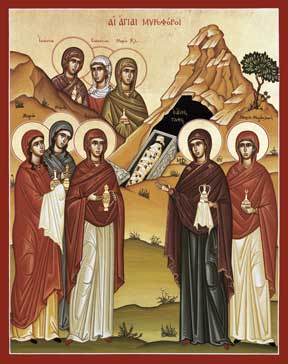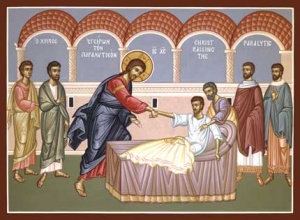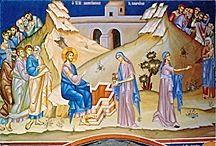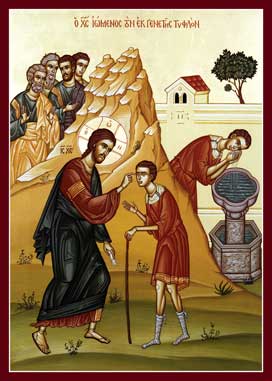Pentecostarion
The Pentecostarion (also known as the Flowery Triodion, Festal Triodion, Paschal Triodion, or Joyful Pentecostarion) is the service book of the Orthodox Church that provides the texts for the moveable portions of the divine services from Pascha through the feast of All Saints (the Sunday following Pentecost).
Contents
- 1 Pascha: The Resurrection of Our Lord and Savior Jesus Christ
- 2 Second Sunday of Pascha: St. Thomas
- 3 Third Sunday of Pascha: The Holy Myrrhbearing Women
- 4 Fourth Sunday of Pascha: The Paralytic
- 5 Fifth Sunday of Pascha: The Samaritan Woman
- 6 Sixth Sunday of Pascha: The Blind Man
- 7 Seventh Sunday of Pascha: Fathers of the 1st Ecumenical Council
- 8 Holy Pentecost
- 9 Sunday of All Saints
- 10 Sunday of the (local church) saints
- 11 External links
Pascha: The Resurrection of Our Lord and Savior Jesus Christ
The Paschal Troparion is sung at each of the daily services until Ascension Day. At each of the Sunday services the Paschal canon and hymns are repeated. The epistle readings are taken from the Acts of the Apostles, telling of the first Christians who lived in communion with the Risen Lord, and all of the gospel readings are taken from the Gospel of John.
Every day during the week of Pascha, called Bright Week , the Paschal services are celebrated in all their splendor. The procession is repeated daily. The doors of the sanctuary remain open. A day without end.
Second Sunday of Pascha: St. Thomas
The Sunday after Pascha is called the Second Sunday. It is the eighth day of the Paschal celebration and the last day of Bright Week. It is called the Antipascha. This Sunday is celebrated in remembrance of the appearance of Christ to the Apostle Thomas "after eight days".
The Church reminds the faithful who have not seen Christ with their physical eyes nor touched his risen body with their physical hands, yet in the Holy Spirit have seen and touched and tasted the Word of Life, and so they believe.
Third Sunday of Pascha: The Holy Myrrhbearing Women
The third Sunday of Pascha is dedicated to the myrrhbearing women who cared for the body of Christ at his death and who were the first witnesses of his Resurrection.
Fourth Sunday of Pascha: The Paralytic
The fourth Sunday is dedicated to Christ's healing of the paralytic, from the Gospel of St John (5). The man is healed by Christ while waiting to be put down into the pool of water.
The Church reminds the faithful that through baptism in the church we, too, are healed and saved by Christ for eternal life. Thus, in the church, we are told, together with the paralytic, to sin no more that nothing worse befall you" (John 5:14).
Wednesday of the Fourth Week after Pascha: Mid-feast of Pentecost
Wednesday of the Fourth Week, thus the 25th day of Pascha, is called the feast of Mid-Pentecost, at which Christ, "in the middle of the feast" teaches men of his saving mission and offers to all "the waters of immortality", from the Gospel of St. John (7:14).
Again the faithful are reminded of the Master's presence and his saving promise: "If anyone is thirsty let him come to me and drink" (John 7:37).
There are three Old Testament readings appointed for Vespers; but, uniquely, no Matins Gospel. In some places an All-Night Vigil is celebrated for this feast, though a Vigil is not called for in the Typicon. At the Divine Liturgy, the reading from the Apostle is Acts 14:6-18, from the Gospel, John 7:14-30.
The icon of the feast depicts the young Jesus in the Temple in Jerusalem speaking with the Elders (Luke 2:46-47), the first biblical example of Jesus as teacher (rabbi). In traditional Orthodox icons of this subject, the figure of Jesus is depicted larger than those of the Elders, showing his superior spiritual status.
Mid-Pentecost has an Afterfeast of seven days with its apodosis. Throughout these eight days (including the day of the feast) hymns of Mid-Pentecost are joined to those of the Paschal season.
Fifth Sunday of Pascha: The Samaritan Woman
The fifth Sunday of Pascha deals with the woman of Samaria with whom Christ spoke at Jacob's Well from the Gospel of St John (4). Again the theme is the "living water" and the recognition of Jesus as God's Messiah (John 4:10-11; 25-26).
This is a reminded of new life in Christ, of drinking of the "living water," of true worship of God in the Christian messianic age "in Spirit and in Truth" (John 4:23-24). Salvation is offered to all: Jews and Gentiles, men and women, saints and sinners.
Sixth Sunday of Pascha: The Blind Man
The sixth Sunday commemorates the healing of the man blind from birth. The Gospel of St John(9) tells how Jesus used clay of spittle and told the man to wash in the waters of Siloam. He did so because it was the Sabbath day on which spitting, clay-making and washing were strictly forbidden. By breaking these ritual laws of the Jews, Jesus showed that he is indeed the Lord of the Sabbath, and, as such, that he is equal to God the Father Who alone, according to Jewish tradition, works on the Sabbath day in running his world.
A reminder that the Lord has anointed our eyes with his own divine hands and washed them with the waters of our baptism.
Leavetaking of Pascha
Pascha has its Leavetaking on the thirty-ninth day, Wednesday of the sixth week of Pascha. In some traditions, the services of the day are celebrated as on the day of Pascha itself, although the daily readings from Holy Scripture differ. After the Dismissal at the Liturgy, the paschal hymns are no longer sung, while the prayer "O Heavenly King" is not said or sung until Pentecost. The Winding Sheet (Plaschanitsa) is taken from the altar and is put in its proper place.
Ascension of Our Lord
On the fortieth day after his passover, Jesus ascended into heaven to be glorified on the right hand of God. The Ascension of Christ is his final physical departure from this world after the resurrection. It is the formal completion of his mission in this world as the Messianic Saviour. It is his glorious return to the Father who had sent him into the world to accomplish the work that he had given him to do (John 17:4-5).
Seventh Sunday of Pascha: Fathers of the 1st Ecumenical Council
On the seventh Sunday of Pascha, we commemorate the holy God-bearing Fathers of the First Ecumenical Council.
Holy Pentecost
Pentecost is the fulfillment of the Christ's mission and the beginning of the messianic age of the Kingdom of God mystically present in this world in the Church of the Messiah. The fiftieth day stands as the beginning of the era which is beyond the limitations of this world, fifty being that number which stands for eternal and heavenly fulfillment in Jewish and Christian mystical piety: seven times seven, plus one.
Sunday of All Saints
The Sunday following Pentecost is dedicated to All Saints, both those who are known to us, and those who are known only to God. There have been saints at all times, and they have come from every corner of the earth. They were Apostles, Martyrs, Prophets, Hierarchs, Monastics, and Righteous, yet all were perfected by the same Holy Spirit.
The descent of the Holy Spirit makes it possible for us to rise above our fallen state and to attain sainthood, thereby fulfilling God's directive to "be holy, for I am holy" (Lev. 11:44, 1 Peter 1:16, etc.). Therefore, it is fitting to commemorate All Saints on the first Sunday after Pentecost.
Sunday of the (local church) saints
On the second Sunday after Pentecost, churches of Slavic tradition commemorate all the saints, known and unknown, who have shone forth in their territory.
Saints of all times, and in every country are seen as the fulfillment of God's promise to redeem fallen humanity. Their example encourages us to "lay aside every weight, and the sin which so easily besets us" and to "run with patience the race that is set before us" (Hebrews 12:1).




